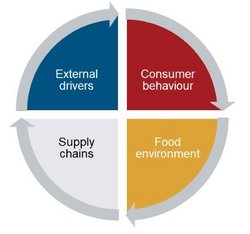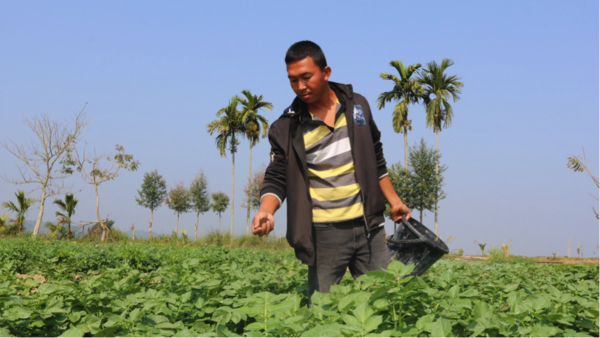 Read this article in French
Read this article in French- Share this article
- Subscribe to our newsletter
Strengthening food systems to address undernutrition challenges
In 2021, the UN Food System Summit sent a strong signal that more inclusive, resilient and sustainable food systems are needed to ensure a better tomorrow. However, concepts don’t change the world – actions do. So how can projects contribute to changes in food systems? The Leadership to Ensure Adequate Nutrition (LEAN) project implemented by a consortium of NGOs including Helvetas Swiss Intercooperation shows how projects can address various food-system outcomes and what it means to look at project outcomes through a food-system lens.

Figure: Main components of the food systems approach
The food systems approach at Helvetas
The food systems approach is an important method used to inform Helvetas projects and programmes as indicated in our current organizational strategy 2021-2024. Helevtas’ understanding of “food systems” follows the framework presented in the HLPE report 2020 of the High Level of Experts on Food Security (figure 1). Even before 2021, however, such a systemic understanding was guiding Helvetas project design and implementation.
Leadership to Ensure Adequate Nutrition (LEAN) - The project in brief
The overall objective of LEAN is to help improve maternal and child nutrition in the Chattogram Hill Tracts in Bangladesh.
LEAN is a consortium between United Purpose, Helvetas, the Global Alliance for Improved Nutrition (GAIN), Caritas Bangladesh, Jum Foundation, and the Integrated Development Foundation. Since 2018, LEAN has been aiming to break the perpetual cycle of undernutrition in rural areas of 18 sub-districts of three hill districts, and targets 82,000 pregnant and lactating women, 100,000 children under five years and 100,000 adolescent girls from 210,000 rural households.
Main food-systems challenges and LEAN response
One of the first obstacles to positive changes in local food systems is lack of or ineffective nutrition governance. LEAN, therefore, is promoting and strengthening such governance, for example by facilitating multi-stakeholder platforms (MSP) at District & Sub-District levels and working closely with public-sector entities and representatives on improving nutrition-sensitive programming.
Another challenge identified at the initial stages of the project is the weak nutrition knowledge in the communities. To raise awareness on healthy and sustainable diets and contribute to consumer behaviour change, LEAN organises sensitisation events at newly established Women Business Centers (WBCs) and school-based interventions. Thanks to these activities, community members and adolescents have become more aware of the importance of consuming a healthy and sustainable diet and are developing a positive attitude towards this.
A sparsely populated and geographically difficult environment hampers access to supply chain services and inputs. Farmers do not have easy access to quality seed, fertilisers, or pesticides and farming methods, which are essential to increase productivity. They also face problems related to storage, collection mechanisms, grading and packaging, and transportation. Trained local service providers (LSPs) can provide better access to services and support farmers in applying innovative, nutrition-sensitive agricultural practices.
The WBCs also offer services and sell nutritious food items, thus contributing to improved local diets. Another important activity to strengthen local supply chains has been the establishment of collection centers which connect producers with other supply-chain actors.
Best practices & lessons learned
The multifunctionality of the WBCs – both providing services and raising awareness – has shown very good results and has helped the centres to establish themselves as an important actor in the food system. The model of training local service providers (LSP) has worked well. As LSPs come from the community they serve, they can easily anticipate the local needs and enjoy a good reputation that facilitates their interventions.
In the initial stage, the participation of women was low due to very strong social barriers. However, an in-depth dialogue with local leaders involving karbaries (village), headmen (union level), religious leaders, union council members convinced the community of the importance of women’s involvement and subsequently their participation rose.
Conclusion
Being a multi-dimensional food and nutrition security project, LEAN addresses multiple entry points for food-system transformation. By working in a multi-stakeholder partnership, recognising the complex nature of food systems and selecting the entry points with the greatest leverage/potential to change, the situation has helped to trigger positive changes in the food system to the benefit of disadvantaged populations.
Authors:
Shamim Ahamed, Kazi Mohammed Hossen, Franca Roiatti and David Bexte, Helvetas Swiss Intercooperation, Zürich, Switzerland. Contact: David.Bexte@helvetas.org
More information:





Add a comment
Be the First to Comment